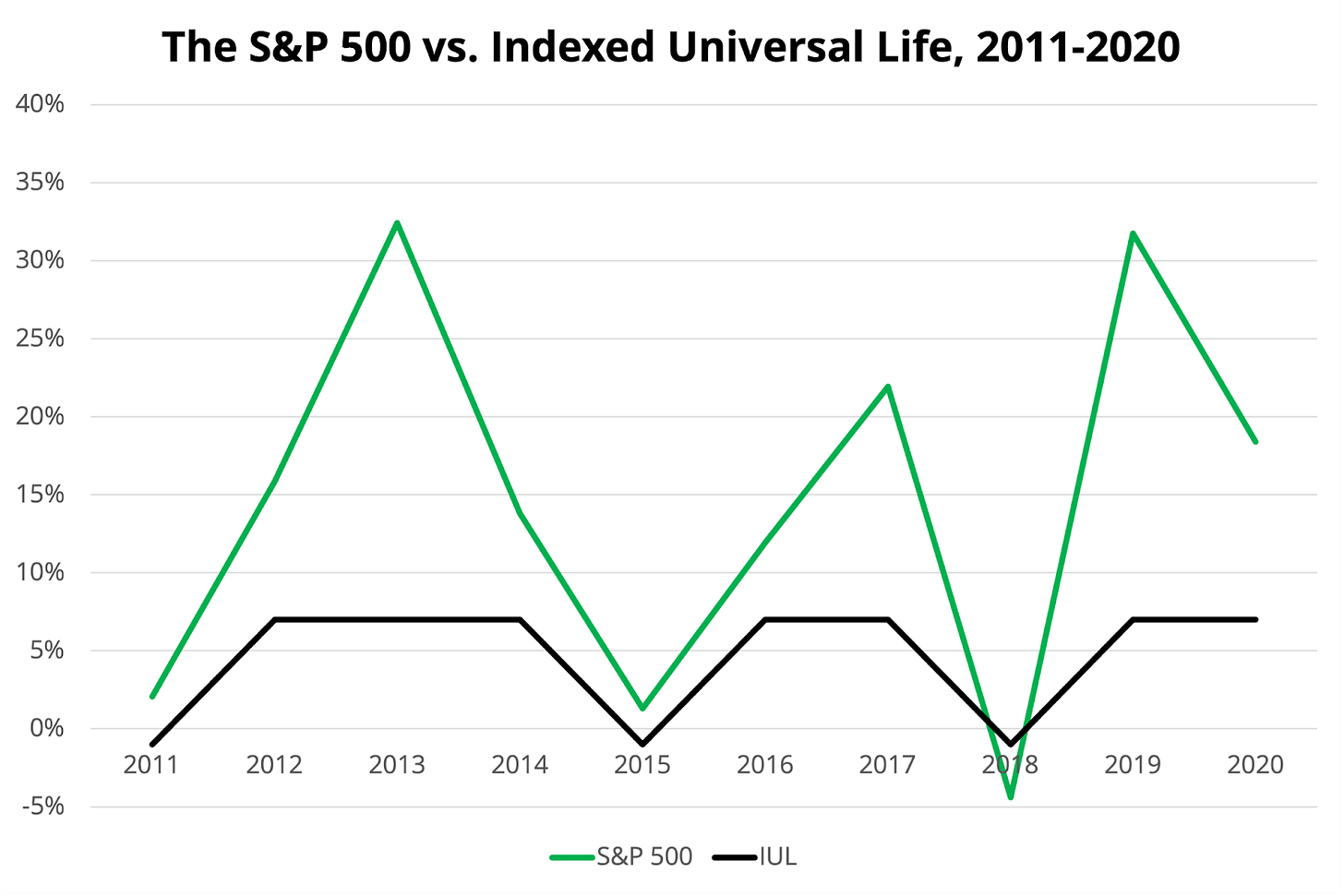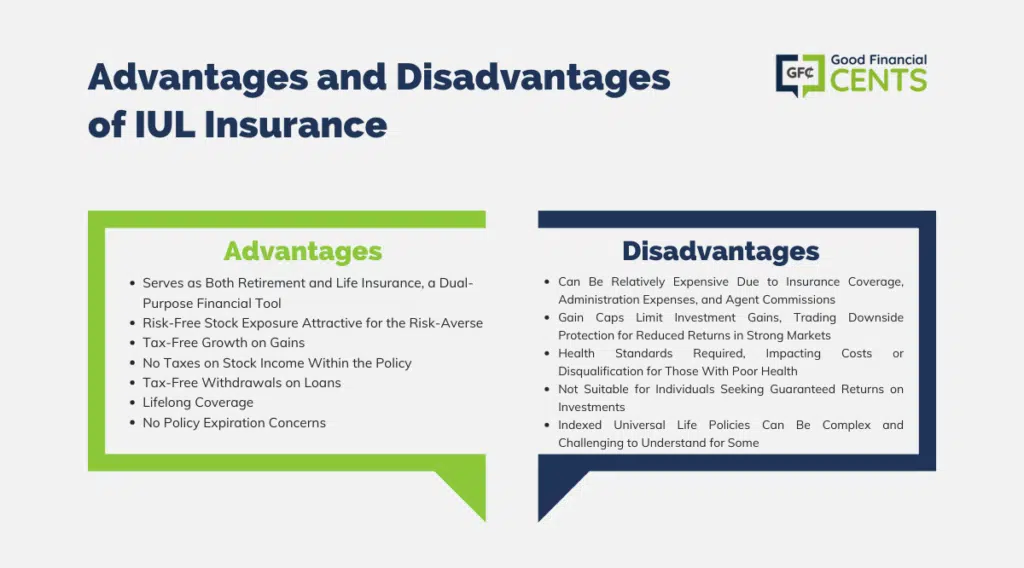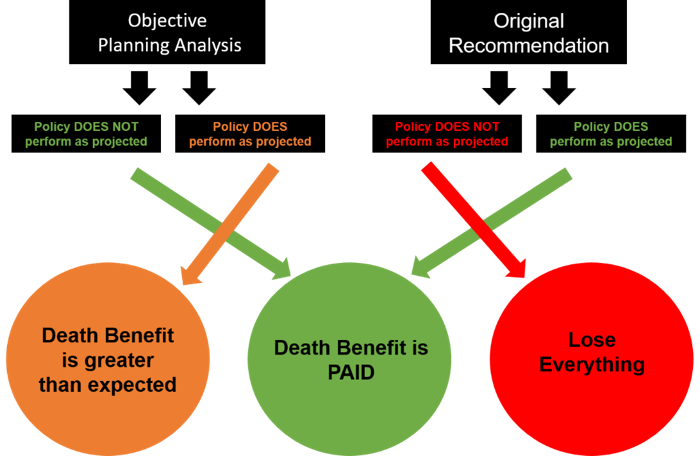All Categories
Featured
Table of Contents
1), commonly in an effort to defeat their group standards. This is a straw man disagreement, and one IUL individuals enjoy to make. Do they compare the IUL to something like the Lead Total Stock Exchange Fund Admiral Show no load, a cost proportion (ER) of 5 basis points, a turn over ratio of 4.3%, and an exceptional tax-efficient record of circulations? No, they contrast it to some dreadful actively taken care of fund with an 8% load, a 2% EMERGENCY ROOM, an 80% turnover ratio, and a dreadful document of temporary capital gain circulations.
Shared funds commonly make yearly taxable distributions to fund owners, also when the value of their fund has actually decreased in worth. Mutual funds not just call for revenue coverage (and the resulting annual taxes) when the common fund is rising in worth, yet can additionally enforce earnings taxes in a year when the fund has gone down in worth.
That's not just how mutual funds function. You can tax-manage the fund, gathering losses and gains in order to lessen taxable circulations to the financiers, however that isn't in some way going to alter the reported return of the fund. Only Bernie Madoff types can do that. IULs avoid myriad tax obligation catches. The ownership of common funds might require the shared fund proprietor to pay estimated tax obligations.

IULs are easy to place to ensure that, at the owner's fatality, the beneficiary is exempt to either revenue or estate tax obligations. The same tax obligation reduction methods do not function nearly as well with shared funds. There are many, often costly, tax obligation catches connected with the moment purchasing and selling of shared fund shares, catches that do not relate to indexed life insurance policy.
Opportunities aren't really high that you're mosting likely to go through the AMT because of your shared fund distributions if you aren't without them. The rest of this one is half-truths at ideal. For circumstances, while it holds true that there is no earnings tax due to your successors when they inherit the earnings of your IUL policy, it is additionally true that there is no income tax because of your beneficiaries when they acquire a mutual fund in a taxed account from you.
What Is The Difference Between Universal And Term Life Insurance
There are much better methods to prevent estate tax concerns than buying investments with reduced returns. Shared funds may trigger earnings taxes of Social Protection benefits.

The development within the IUL is tax-deferred and may be taken as free of tax revenue by means of loans. The plan owner (vs. the mutual fund supervisor) is in control of his/her reportable revenue, thus allowing them to lower and even eliminate the tax of their Social Protection advantages. This is terrific.
Below's another minimal issue. It's real if you buy a shared fund for say $10 per share prior to the circulation day, and it distributes a $0.50 circulation, you are after that mosting likely to owe tax obligations (possibly 7-10 cents per share) although that you haven't yet had any gains.
Yet ultimately, it's truly regarding the after-tax return, not just how much you pay in tax obligations. You are mosting likely to pay more in taxes by using a taxed account than if you purchase life insurance policy. You're also possibly going to have more money after paying those taxes. The record-keeping demands for owning shared funds are substantially more intricate.
With an IUL, one's records are kept by the insurance policy company, copies of yearly declarations are mailed to the owner, and distributions (if any) are totaled and reported at year end. This is additionally kind of silly. Naturally you should keep your tax obligation records in instance of an audit.
Columbus Life Iul
All you have to do is push the paper into your tax folder when it appears in the mail. Barely a factor to purchase life insurance policy. It's like this individual has actually never ever purchased a taxable account or something. Common funds are commonly component of a decedent's probated estate.
Furthermore, they go through the delays and costs of probate. The proceeds of the IUL plan, on the other hand, is constantly a non-probate circulation that passes beyond probate directly to one's named recipients, and is as a result exempt to one's posthumous lenders, undesirable public disclosure, or comparable delays and prices.
Medicaid incompetency and life time income. An IUL can give their proprietors with a stream of earnings for their entire lifetime, no matter of just how lengthy they live.

This is beneficial when arranging one's affairs, and transforming assets to income before a nursing home confinement. Common funds can not be transformed in a comparable way, and are nearly constantly thought about countable Medicaid assets. This is one more foolish one supporting that poor individuals (you understand, the ones who need Medicaid, a government program for the bad, to spend for their assisted living facility) ought to use IUL rather than mutual funds.
Index Universal Life Vs Whole Life
And life insurance policy looks dreadful when contrasted fairly versus a retired life account. Second, people that have money to purchase IUL above and beyond their pension are mosting likely to have to be dreadful at taking care of money in order to ever before receive Medicaid to spend for their retirement home expenses.
Chronic and incurable health problem cyclist. All policies will certainly enable an owner's easy accessibility to cash money from their plan, usually waiving any type of surrender charges when such people endure a significant illness, require at-home treatment, or come to be constrained to a nursing home. Shared funds do not offer a comparable waiver when contingent deferred sales costs still apply to a common fund account whose owner requires to sell some shares to money the prices of such a keep.
Iul Insurance Policy
You get to pay more for that benefit (biker) with an insurance coverage plan. Indexed global life insurance coverage gives death benefits to the beneficiaries of the IUL proprietors, and neither the proprietor nor the recipient can ever shed money due to a down market.
I certainly do not require one after I get to economic freedom. Do I want one? On average, a buyer of life insurance coverage pays for the true expense of the life insurance benefit, plus the costs of the plan, plus the revenues of the insurance policy company.
Best Performing Iul
I'm not entirely sure why Mr. Morais threw in the entire "you can't lose money" once again here as it was covered rather well in # 1. He just wanted to repeat the most effective marketing factor for these points I suppose. Once more, you don't shed small dollars, yet you can shed real bucks, along with face serious chance cost as a result of reduced returns.

An indexed global life insurance coverage plan owner might trade their policy for a totally different plan without causing income taxes. A shared fund proprietor can stagnate funds from one shared fund company to one more without selling his shares at the former (thus setting off a taxed occasion), and buying brand-new shares at the latter, typically subject to sales fees at both.
While it holds true that you can exchange one insurance coverage for one more, the reason that people do this is that the first one is such a dreadful plan that even after purchasing a new one and going through the very early, negative return years, you'll still come out ahead. If they were sold the best policy the initial time, they shouldn't have any desire to ever exchange it and go through the very early, unfavorable return years once again.
Latest Posts
Best Universal Life Insurance Rates
Columbia Universal Life
Selling Universal Life Insurance